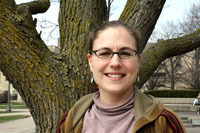
For a writer, freedom of expression is no less integral to the creative process than a blank sheet and a great idea. But in a number of nations around the world, such a liberty does not exist, replaced instead by the right to discuss only what the government says you can.
Researching how the threat of censorship affects playwrights, Yael Prizant, assistant professor of film, television and theatre (FTT) at the University of Notre Dame, found examples from Cuban theater in many of the case studies.
“Once I read a few plays from the island, I was hooked,” says Prizant, who joined the FTT faculty last fall. “I began exploring how playwrights say what they want or need to say without saying what they know will not be tolerated.”
She soon concluded that Cuban theater could not be studied without considering both the playwrights who stayed on the island and those who emigrated.
“My research strives to put Cuban-American plays in conversation with Cuban plays, allowing connections, reflections, intricacies and globalization to emerge for investigation,” Prizant says. “I am curious about how the works engage each other and how history, economics and ideology shape theatrical views in both countries.”
Prizant encourages this curiosity in the classroom, as well. In her course “The Hyphenated American,” students think critically about how the cultures of American immigrant communities influence the theater they produce. As with every class she teaches, she also aims to enhance her students’ appreciation of art.
“If students become informed, thoughtful audience members, my courses will have been successful,” says Prizant, who also teaches a class on dramaturgy. “I believe that students are involved when they encounter theater that reflects their cultural heritages, challenges their personal views and appeals to their aesthetic ideals.”
Prizant’s decision to come to Notre Dame had a lot to do with the resources available to faculty and students, both in the form of financial support to research and study abroad and opportunities presented by FTT’s dynamic home.
“The state-of-the-art DeBartolo Performing Arts Center is physical proof of Notre Dame’s ongoing commitment to the arts on campus and within the community,” Prizant says. “My students and I are able to see internationally renowned artists perform without leaving South Bend, as well as create our own theatrical work in top-notch performance spaces, while integrating important technologies into our studies and creative endeavors.”
Prizant currently is writing an article on Cuban-American playwrights living and writing in exile. In the piece, she explores exile from two perspectives—from one’s native country and within one’s native country—and how each view contributes to redefining the concept of “home.” The article will be published in the forthcoming collection “Performance, Exile and ‘America,’” part of Palgrave Macmillan’s “Studies in International Performance” series.
Contact: Yael Prizant, yprizant@nd.edu